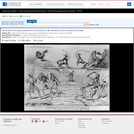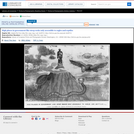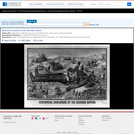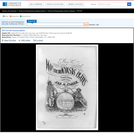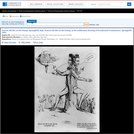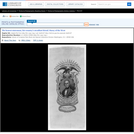The strongly racist character of the Democratic presidential campaign of 1868 is displayed full-blown in this elaborate attack on Reconstruction and Republican support of Negro rights. Horses with the heads of Democratic candidate Horatio Seymour and running mate Francis P. Blair, Jr., pull a fine, ornate carriage in a race with a rude wagon drawn by asses with the heads of Republican candidates Ulysses S. Grant and Schuyler Colfax. The Democratic carriage pulls ahead in the race, heading toward a cheering crowd and a series of floral arches held by young maidens. The U.S. Capitol is visible beyond. In the carriage are four allegorical figures: Liberty, holding the Constitution and a banner which reads "Our Glorious Union Dü_üąistinct, like the Billows, One, Like the Sea' This is a White Man's Government!"; Navigation, holding a miniature ship; Agriculture, holding sheaves of wheat and a scythe; and Labor, represented by a bearded man with a hammer and flywheel. In contrast to the Democratic vehicle, the Republican wagon has stalled before a pile of rocks and a cemetery strewn with bones representing "100,000,000 White Lives, the Price of Nigger Freedom!" Its wheels are blocked by a large stone "Killing Taxation" and a skeleton. Other stones represent "Ruined Commerce," "$30,000,000 stolen from the Treasury," and "Negro Supremacy." In the wagon are the grim reaper, Pennsylvania representative and abolitionist Thaddeus Stevens, an unidentified man, a black woman, and an idle black man. Stevens: "Colfax pulls like the d----l but old tangleleg [i.e., Grant] aint worth a d----n! Push at the tailboard, Ben!" Massachusetts representative and former Civil War general Benjamin F. Butler, pushing the wagon from the rear, replies, "I am pushing, Thad! but we are stuck. Seymour is a mile ahead now." Silver spoons protrude from Butler's pocket. (For the origins of Butler's nickname "Silver Spoons," see "The Radical Party on a Heavy Grade," no. 1868-14.) The black woman reassures Stevens, "Don't worry you'sef, honey, or you'll peg out afore we get de paeket for Seymour's in de White House and we's good for Salt River [colloquialism for political disaster]." The black man asks, "War's dis wagon gwine wid dis member ob Congress. I'd jes like to know?" The unidentified man remarks, "The Democracy would not take me so I thought I'd come back & stick by you Uncle Thad, and we'll all go to H-ll together!" Death announces, "My friends 1,000,000 slaughtered soldiers block the wheels--you fooled them, and they now impede your progress!" At bottom right a group of bummers, a term referring to party hangers-on, carpetbaggers, and other disreputable characters, stand in line to buy tickets to Salt River. At left New York "Tribune" editor Horace Greeley invites abolitionist preacher Henry Ward Beecher to play the thimblerig. Nearby a black couple in rags express their desire to return to their former master. At top right, next to the U.S. Capitol, a group of black youths in striped outfits dance and tumble about. In the lower right margin are prices and information regarding ordering copies of the print by mail. "Price 25 cents mailed. 5 for $1.00. 60 for $10.00, 100 for $16.00. Nothing sent C.O.D. Express charges paid by Parties ordering. Address: Bromley & Co. Box 4265. New York City.|Entered . . . l868 by Bromley & Co. . . . New York|Title appears as it is written on the item.|Lorant, p. 303.|Weitenkampf, p. 157.|Forms part of: American cartoon print filing series (Library of Congress)|Published in: American political prints, 1766-1876 / Bernard F. Reilly. Boston : G.K. Hall, 1991, entry 1868-15.
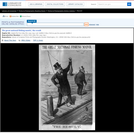
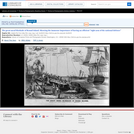
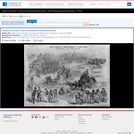
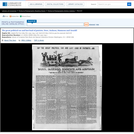
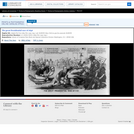
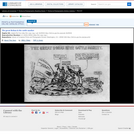
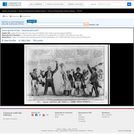
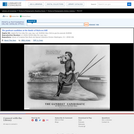
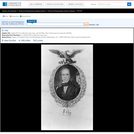
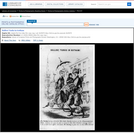
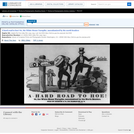
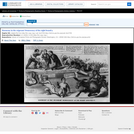
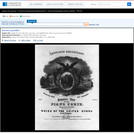
![["Harrison & Tyler" Campaign Emblem]](https://img.oercommons.org/160x134/oercommons/media/upload/materials/screenshots/materials-course-76001.png)
